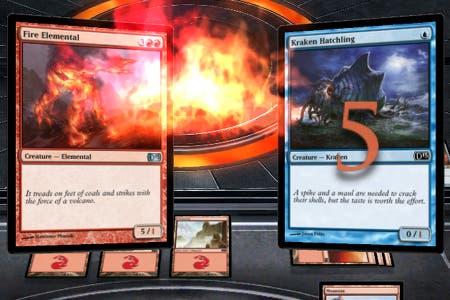Magic: The Gathering - Duels of the Planeswalkers 2013 Review
Gee wizard!
Magic: The Gathering is a game so big that everyone has an opinion - even folk who don't have a clue what it's about. Released way back in the early '90s, it has expanded and booster-packed its way to being the daddy of collectable card games, leaving a host of imitators in the dust. The cards change and the rules are tweaked, but the Magic stays the same.
Though you can play with more than two players, and indeed certain modes are built for this, by far the most common way to play Magic is one-on-one. Each player is a planeswalker, i.e. wizard, and takes it in turns to build up a mana pool before using this energy to cast spells and summon creatures. Both players have 20 life, and the game is to get your opponent's health below 0.
What happens within these confines is impossible to summarise. Magic is a game of huge depth, but thanks to the way it has been constantly added to and refreshed over two decades, it is also one of enormous breadth. There are thousands of individual cards, as well as subsequent game modifiers like Planechase (included here as a standalone mode).
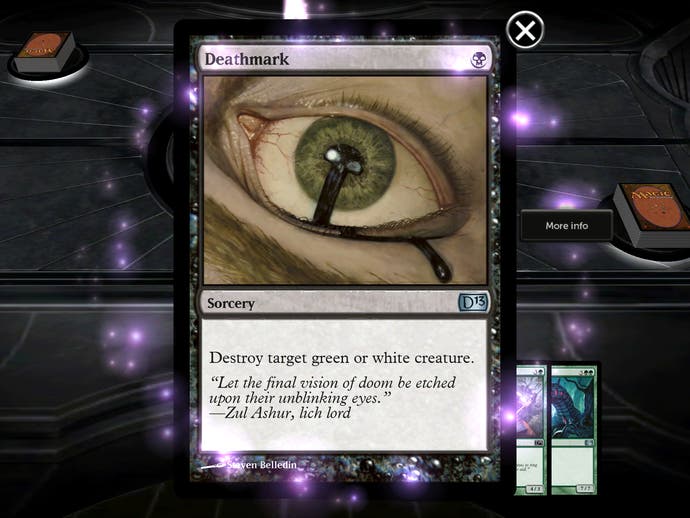
One thing Duels of the Planeswalkers 2013 shows is how much Stainless Software has learned over years working on the franchise, with a card selection that will be familiar to veterans but hits the sweet spot. The ready-built decks are unlocked with a swift campaign run-through that first shows them in action, your opponent suggesting tactics to be picked up and improved upon. As each deck is used, more of its cards unlock, and you start to see the hidden possibilities, the combinations that can create an army where there was none, or turn an opponent's offense into nothing.
Magic's great pleasure, and one that Duels of the Planeswalkers' multi-part campaign captures, is seeing how the different types of deck work against each other. All cards are divided into five colours, which give you a rough idea of the type of magic being used - black cards are generally evil, necromancers and vampires kind of stuff, while red cards are all fire beasts and offensive spells. You can choose to be a dragon-summoner, lining up ranks of goblins in the early game for nuisance value before launching great beasts that devour the frontline and become stronger in the process. Or you could play with your opponent's mind, enchanting his creatures and forcing constant discards, making his deck run dry for a bloodless victory.
This interplay exists in every game of Magic, and the genius is in how it always works out slightly differently. I've been using the Green deck, which is filled with strange beasts and nasty spells, but depending on the draw and how an opponent's playing, the tactics change every time.
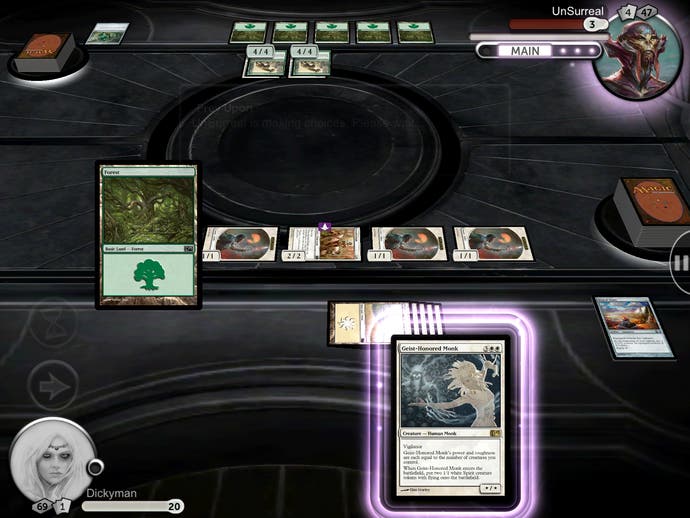
The first campaign run-through isn't especially hard, serving to introduce the basic strategies and unlock the decks, but the Revenge campaign that immediately follows gives your opponents nasty new tricks and resiliences. Dotted between the main opponents in both campaigns are a series of 'Encounters', bespoke battles where you learn to play against an exact style while unlocking another card to boot, an optional extra that's great for learning hard counters.
That's not even as far as single-player goes, with a whole Planechase campaign of multi-opponent duels and a self-contained Challenge mode with head-scratching scenarios. Beyond the first campaign's relative ease, it's hard to generalise about the 'difficulty' of Duels of the Planeswalkers' single-player because of that element of luck. Magic is without doubt a skill-based game, with much of how a battle plays out in your own hands, but even so you're depending on the draw to give you the tools to work with. In one or two games you'll find yourself mana-starved, with a hand full of powerful creatures but no way of getting them down, and those are the breaks. Just as often, you'll pull the perfect clutch card and turn a match on its head.
That element of surprise is Magic's enduring appeal, to me at least. Play this game for years and you'll still see people coming up with crazy strategies, back-door escapes that look impossible, and decks that absolutely crush your invincible warriors. Never mind tactics you haven't seen before, half the time someone plays a card you haven't seen before - such is the size of this monster.
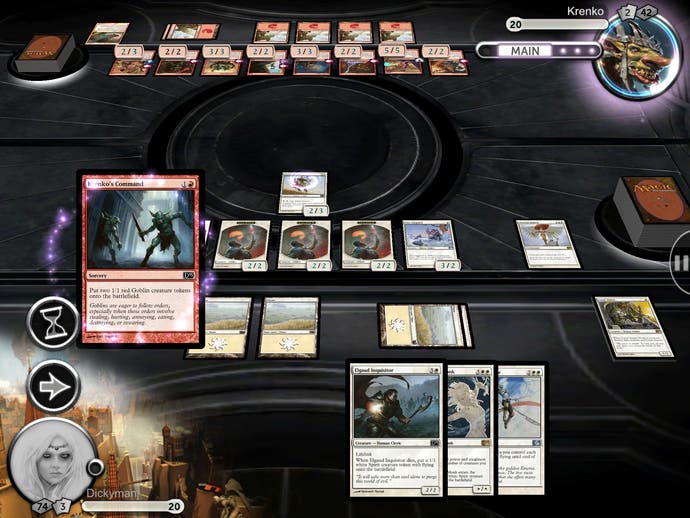
The online game, unlike last year's model, now tracks certain stats in a player profile as well as your worldwide ranking. When in a game it works smoothly, with the only irritating feature being the way players who disconnect are replaced by AI, rather than automatically forfeiting. But Duels already has a huge playerbase, with match searches typically taking less than 30 seconds, and a big spread of talent. There are both Free-For-All and Planechase modes, which in conjunction with the deck builder make Duels 2013 a seriously involving multiplayer experience.
If that makes Magic sound intimidating, then it's also why Duels 2013 is such a great Magic video game. It doesn't contain every card, not by a long shot, and doubtless there are those who would prefer some kind of all-encompassing compendium (a role currently fulfilled by Wizards of the Coast's online version). But it is a generous shard of that greater whole, one that manages to incorporate most styles of card alongside solid starting decks to build from. For curious players, there couldn't be a better introduction.
There's another reason Duels 2013 is important for Magic, and particularly for new players. Magic has a bit of an image problem, most notably evidenced in Gizmodo's spiteful stunt from last year, 'My Brief OK Cupid Affair with a World Champion Magic: the Gathering Player'. It's seen as one of those things, a bit like Games Workshop, that you might do in secret but never really talk about. There's a bizarre social stigma that stereotypes players of certain games as beardy weirdoes and dice-rolling nerds, and Magic is one of them. Well, ignorance is everywhere, and I think anyone who plays Magic is awesome.
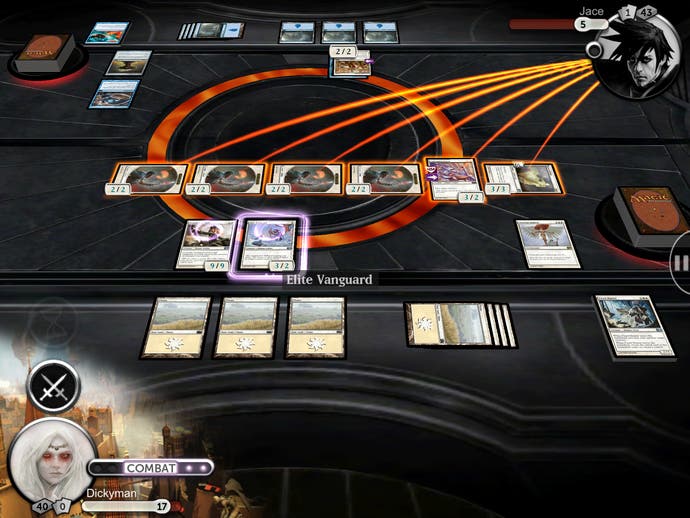
But there is one thing about Magic as a physical game. I used to play with the cards, and it's confusing until you know what you're doing: putting down counters to indicate buffs, remembering what phase happens next, checking everything's tapped properly. The automation of Magic's mundane aspects in Duels is worth the trade-off of losing physical cards. It's so much easier and more enjoyable, for me at least, to have the computer do all the number-crunching and shuffling. Though there are endless layers of subtlety, Magic at core is about cause-and-effect, and being able to focus purely on your hand and strategy is a blessing.
The Duels of the Planeswalkers series has been doing this for years, of course, but perhaps what brings it home in Duels 2013 is the game's iPad debut. Card games in general work beautifully on tablets, and the intuitive controls and polished visuals see Magic get it right first time. It's not quite as fluid as a card game designed for tablets from the get-go (such as Assassin's Creed: Recollection), but that comes down to the turn-based nature rather than any fault in the implementation.
Magic: The Gathering is an amazing game, easily one of the best I've played in any medium. Duels of the Planeswalkers 2013 is its best video game translation yet, a perfectly pitched blend of hard strategy and endless tinkering with unlocks that just keep on coming. The immediate future for collectable card games is surely tablet-based - so for Magic, the biggest of them all, Duels of the Planeswalkers 2013 feels like some kind of homecoming.
